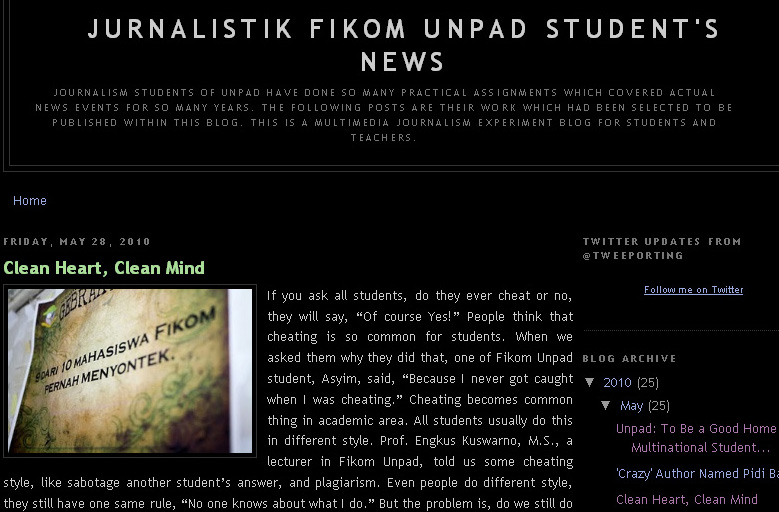
Social networking sites have become an essential newsroom tool for any budding reporter but nowhere as successful and popular as in the world’s largest Muslim country: Indonesia.
And in my case as a roving teacher/trainer, never has any course I’ve run been as popular or successful as an Australian Business Volunteers (ABV) assignment to kick-start an Introduction to Multimedia in the journalism school at Padjadjaran University (Unpad) in Bandung, West Java, in May/June 2010.
To prepare for the five-week course I already had under my belt nine weeks teaching experience in late 2009 for ABV at Unpad with their first news layout and design course. I used an author’s draft copy of Rob Layton’s excellent upcoming book Editing and News Design* to bring my students up to speed on a subject I had taught for more than decade. My recommendations which Unpad embraced at the time laid the groundwork for the follow-up course: namely switch design software from CorelDraw to InDesign and install a robust wi-fi network to cover the huge campus.
My groundwork before flying off to Bandung was to have a full day’s demo of The Australian Financial Review’s new world-class multimedia system which left the Sydney Morning Herald staffers who sat in on the demo with mouths gaping. The AFR visit was generously organised by Fairfax editorial training manager Jock Cheetam who I later roped in for a guest Unpad lecture on a swing through Java. I told the AFR assembled gurus in Sydney that I had been a board member of the American Atex News Users Group in the 1980s and had attended many “blue sky” wishlist development sessions of US newsroom systems.
My verdict on the AFR’s platform; You’ve finally landed on Mars.
So here was my Bandung challenge: Fire up a class of 73 Indonesian students, all with fairly good English skills and all avid internet users, to do a news reporting exercise using a minimum of three media formats: print, video, photography and sound bites for radio. Unpad is equipped with excellent facilities and even runs its own community radio station.
The first classes were sounding sessions to find what software we would use in a country where you can buy anything and the latest in computer programmes for the price of bottled water at Sydney International Airport.
All on Facebook
One thing everyone except yours truly had in common: they were all on Facebook - every student, all staff from the Head of School to the campus drivers. As a result, I signed up after resisting for ages, then the two lecturers, Adi Wibowo Octavianto, Gumgum Gumilar and I, worked out how we would run a realistic multimedia exercise with uploads 24/7.
We split the students into nine teams of five to eight students. They elected an editor/producer for each team and assigned students to skill-based roles such as video producer, photo editor, copy editor and program producer. We built Facebook pages with the family name Dapnu (Unpad backwards) then gave them Cantonese numbers as first name: yat, yee, sam say etc. The only “friends” were team members plus three teaching staff.
What I learnt was that of the 220 million people in Indonesia, 21 million, and rapidly growing, are on Facebook. Indonesia dominates social networks compared to other Asian countries.
Facebook and Twitter have become Indonesia’s “fifth estate” according to the Commissioner of the Indonesian Telecommunications Regulatory Authority (BRTI), Heru Sutardi.
Bangkok-based freelance journalist Jon Russell reported on the Asian Correspondent website: “Sutardi’s catching “fifth estate” soundbite is backed up examples which paint Indonesia as a social media utopia, with sites like Facebook and Twitter providing a voice and power for the people.”
An example was the case of two leaders of Indonesia’s Corruption Eradication Commission (KPK) released from jail with the aid of a defence campaign led by a Facebook group (A Million Facebookers Support Chandra Hamzah and Bibit Samad Riyanto) that has 1.4 million members.
Jailed mother
In June 2009, a mother-of-two was jailed for defamation after an email complaint she made against a hospital appeared on Facebook. A Facebook group of 100,000 paid her legal bills and protested her innocence. She was later acquitted.
“Sudati told the website futuregov.asia’s editor Robin Hicks: “It can now be said that social networks have become ‘the fifth estate’ in Indonesia, alongside the legislative, executive, judicative and the media.”
So naturally our Unpad student challenge was enthusiastically decided to be in the Fifth Estate. In the second week of the course, after fine-tuning the team social network setups, a side challenge was for other teams to hack the competing teams’ pages. Two students had personal pages seriously hacked during the course while debate raged internationally about Facebook’s privacy and security settings.
I could see varying reactions on student and staff faces when we set the main assignment: every team had to produce a minimum of three reports in three media formats. The reports had to include general news, campus news and a lifestyle story. The biggest reaction was when I insisted for the first time on campus it would be in ENGLISH and not Bahasa.
We decided it wasn’t fair to use Twitter as Bond University had done in a multimedia reporting exercise due to the text character limits as well as using a second language.
To fast-forward they produced a special tee-shirt at my farewell dinner which had the words “So sorry my English is so bad”. Which was the opposite in reality.
So for the first time we didn’t need a classroom for the rest of the course. Everyone had a state-of-the-art mobile phone (many had Blackberries and a couple Iphones) plus Notebooks and laptops with wif-fi. I discovered there were few places in the old colonial capital Bandung, famous as a shopping, eating and Jakarta-getaway paradise, that didn’t have free wi-fi. My apartment in the heart of Bandung had unlimited wi-fi for 10,000 Rupiah a month or US$1.
Showcased stories
The student teams ranged far and wide for their stories and produced some excellent reports by any national standard and in a second language. My colleague Adi, who I rank now as one of the net gurus of Indonesia, built a site to showcase the finished results of the students work: www.jfunews.blogspot.com
Several students were snapped up for internships in Jakarta and in local bureaus of national media after the course. These included the English-language Jakarta Post and Jakarta Globe plus the biggest multimedia news site www.kompas.com
Since completing the course at the time of writing I found I had close to 200 “friends” on Facebook – the majority from Indonesia, many from East Timor, PNG, Solomons and even a former Vietnamese student, from my time teaching at Griffith University, now working as a journalist in Hanoi.
My last advice for students was to caution about the hazards of what they post on any social networking site. I gave them endless examples of reporters losing their jobs over Facebook or Twitter comments.
A couple of male students in particular removed on my advice personal portraits of themselves holding assault rifles at one of many commercial shooting ranges in Asia. They saw my point that it was highly likely first-world intelligence services would trawl social networks for image or text “indicators” that could lead to being tagged a terrorism suspect or simply being refused a student visa for no reason.
The rapid development of social networks like Twitter and Facebook have become essential tools naturally for activists in politics as well as social change. The use of these networks will mean journalists using the internet will need a revision of their ethics guidelines and greater skills at verifying sources and sifting the gems in this instant avalanche of information and hearsay.
Since returning to Australia, I remain in daily contact with my Indonesian colleagues and students. The next ambitious plan is to help fellow journalists in East Timor, which has the region’s lowest internet useage (1800 users or .02 percent of the population in 2009 according to Wikipedia).
The aim is to produce a low or no-cost news website firstly on social networks then a standalone site with daily updates in four languages (English, Tetum, Bahasa and Portuguese). A case of Mars after the Moon?
* Editing and News Design: How to Shape the News in Print and Online Journalism, by Rob Layton. Published by Palgrave Macmillan. A$62 (ISBN 9781420256376)
Ref sites: www.jfunews.blogspot.com
www.unpad.ac.id
www.designeditor.net
www.us.asiancorrespondent.com
www.futuregov.asia
www.abv.org.au
www.bond.edu.au



